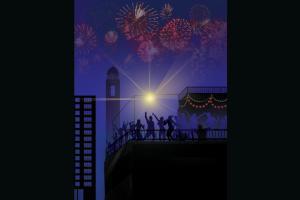I had been invited to the Dhaka International Film Festival to present a keynote paper on New Trends in Feminist Films from South Asia

Illustration/ Uday Mohite
 One of the many gifts cinema has given me, is a chance to travel the world, to see how others live, and appreciate what makes us all kin. Recently, I was lucky to celebrate Sankranti in Dhaka, Bangladesh, and it was like no Sankranti in India.
One of the many gifts cinema has given me, is a chance to travel the world, to see how others live, and appreciate what makes us all kin. Recently, I was lucky to celebrate Sankranti in Dhaka, Bangladesh, and it was like no Sankranti in India.
ADVERTISEMENT
I had been invited to the Dhaka International Film Festival to present a keynote paper on New Trends in Feminist Films from South Asia. Festival director Ahmed Muztaba Zamal requested me to do two more presentations, on How to Create A Festival Strategy for Your Film and on Initiatives to Support Women Filmmakers in South Asia and Worldwide. Bas, I thought, now I needed to go see the town.
One of the most wonderful experiences I had was celebrating Sakrain (their name for Sankranti) in Puran Dhaka (Old Dhaka). There was a lot of kite-flying from terraces during the day, but by late evening, it was party time. You had to know someone who knew someone with a terrace there. My filmmaker friend Rezwan Shahriar Sumit made a bunch of calls—his engineering college-going sister Rosen was headed there with her classmates too. Sumit's cricket and football friends Abed Ali Khan and national cricketer Javed Omer Belim, set us up to party on Nadim bhai's terrace in Narinda in Puran Dhaka.
After zig zagging through patli gullies, we climbed to the terrace of a six-storeyed building with no lift. What I saw was unbelievable: there were a zillion Sakrain terrace parties as far as the eye could see. People had disco parties with DJs, mirror-balls, strobe lights, with people dancing to Dhakaiya and Bollywood music, and everywhere, coloured laser lights criss-crossed the night sky. Soon,there were fireworks on every terrace, as night drone cameras captured the action—Sakrain 2.0 indeed!
Nadim bhai, our very generous host, warmly welcomed us like we were family. He lives in the building with eight brothers, in a large joint family of about 45 (the ninth brother lives elsewhere). There was music, dancing and feasting with home-made chicken biriyani, payesh and bhapa pitha, a delicious sweet made from rice flour, coconut and khejur gur (date palm molasses).
Abed bhai, a cool guy in a ponytail, leather jacket and blue jeans, turned out to be the vice-principal of the Old Dhaka International School. He said he had turned down a scholarship to study robotics in Germany, to start an English medium school in Puran Dhaka for the locals. "My father is from Bangladesh and my mother is from Lucknow. Hindus and Muslims have lived closely as a community for 400 years in Puran Dhaka," he said. "Hindus celebrate Muslim festivals like Eid and Ramadan, and Muslims celebrate Hindu festivals like Kali Puja, Saraswati Puja, Durga Puja and Sankranti." Beyond me rose the grand minaret of the Vinod Bibi mosque. Nadim bhai explained that a Hindu lady, Vinod, had given the land for the mosque, so it was named after her. Such is the genuine amity in the area. I left with a brimming heart, overwhelmed by their generosity and inclusiveness.
Meenakshi Shedde is India and South Asia Delegate to the Berlin International Film Festival, National Award-winning critic, curator to festivals worldwide and journalist.
Reach her at meenakshi.shedde@mid-day.com
Catch up on all the latest Mumbai news, crime news, current affairs, and also a complete guide on Mumbai from food to things to do and events across the city here. Also download the new mid-day Android and iOS apps to get latest updates
 Subscribe today by clicking the link and stay updated with the latest news!" Click here!
Subscribe today by clicking the link and stay updated with the latest news!" Click here!







